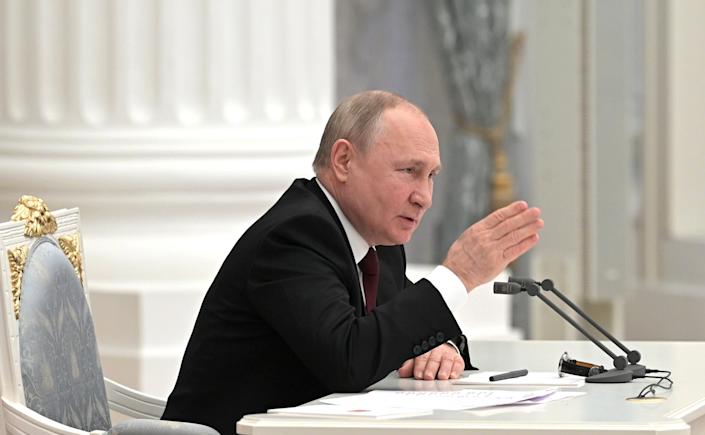WASHINGTON — Europe edged closer to war on Monday as Russian President Vladimir Putin ordered troops into Donetsk and Luhansk, two territories in Ukraine on which Russia has laid claim for years. He did so under the guise of “peacekeeping,” even as he made clear that he did not accept the basic premise of Ukrainian sovereignty.
“Ukraine is not just a neighboring country, they are a part of our culture,” the Russian leader said in a Monday night speech. Many Russians, especially those with fond memories of the Soviet Union, feel much the same way. But it is not clear that they are willing to risk a costly conflict to achieve Putin’s vision of reconstructing the Soviet-era empire. Having concluded that a Russian invasion is all but assured, the United States and allied Western powers have committed to defending Ukraine with economic sanctions and shipments of military hardware — but have steered clear of committing troops.
“This was a speech to the Russian people to justify a war,” a senior Biden administration said on Monday of Putin’s remarks. The Russian strongman justified sending troops to Donetsk and Luhansk by first claiming that the two regions, which border Russia, were “independent” of Ukraine. International observers widely consider that to be a dubious claim.
President Biden spent the weekend in Washington, planning for what he has maintained in recent days would be an imminent Russian invasion. He responded to Putin’s claims on Donetsk and Luhansk on Monday afternoon with an executive order designed to “prohibit new investment, trade, and financing” by American entities in the two breakaway regions, according to a statement from White House press secretary Jen Psaki.
Biden spoke on Monday with Ukrainian leader Volodymyr Zelensky “to reaffirm the commitment of the United States to Ukraine’s sovereignty and territorial integrity,” according to a White House description of the call. Ukraine, however, is not a member of NATO, meaning that the U.S.-led alliance would not send troops under its Article 5, which provides for a collective military defense of member states.
A seasoned diplomat from his time in the U.S. Senate and the vice president to Barack Obama, Biden has vowed to restore the U.S. to the role of international leadership he claims his predecessor, Donald Trump, squandered. But the disastrous Afghanistan withdrawal of U.S. forces — which took place almost exactly six months ago — appears to have tarnished Biden’s claims of foreign policy mastery.
Putin seems intent on challenging Biden’s leadership; late on Monday, columns of Russian troops were spotted entering Donetsk.
In recent days, some of the most consequential shuttle diplomacy meant to avert a war in Ukraine has been undertaken by French president Emmanuel Macron, who on Sunday appeared to broker a meeting between Putin and Biden scheduled for later in the week. Biden spoke with Macron and chancellor Olaf Scholz of Germany on Monday. “They discussed how they will continue to coordinate their response on next steps,” a White House summary of the call said.
It remains unclear whether Putin intends to launch an all-out invasion of Ukraine or is merely engaging in a show of force to intimidate the country and its Western allies. He has made clear again Monday that he sees the expansion of Western alliances like NATO into former Soviet bloc countries as a threat. At the same time, responding to that perceived threat with an invasion could trigger harsh sanctions and the cancellation of the Nord Stream 2 energy pipeline. Such moves could cripple a Russian economy that largely relies on resource extraction.
A keen student of Russian history, Putin is acutely aware that the disastrous invasion of Afghanistan in the 1980s helped bring about the downfall of the Soviet Union. Then, Russia’s fledgling democracy was imperiled by the cruel and, many say, pointless campaign in Chechnya, a conflict that helped facilitate Putin’s own rise from obscurity. With his own support among the Russian population faltering, Putin risks seeing a full-blown war in Ukraine further erode his standing, especially if Western forces aid Ukraine as they have promised.
Late Monday, at the request of Zelensky, the United Nations Security Council was set to meet regarding the situation in Ukraine.
For the moment, the U.S. foreign policy establishment is operating on the assumption that an invasion will take place. On Monday, Biden ordered U.S. diplomats who had remained in Ukraine out of the country, into neighboring Poland.




